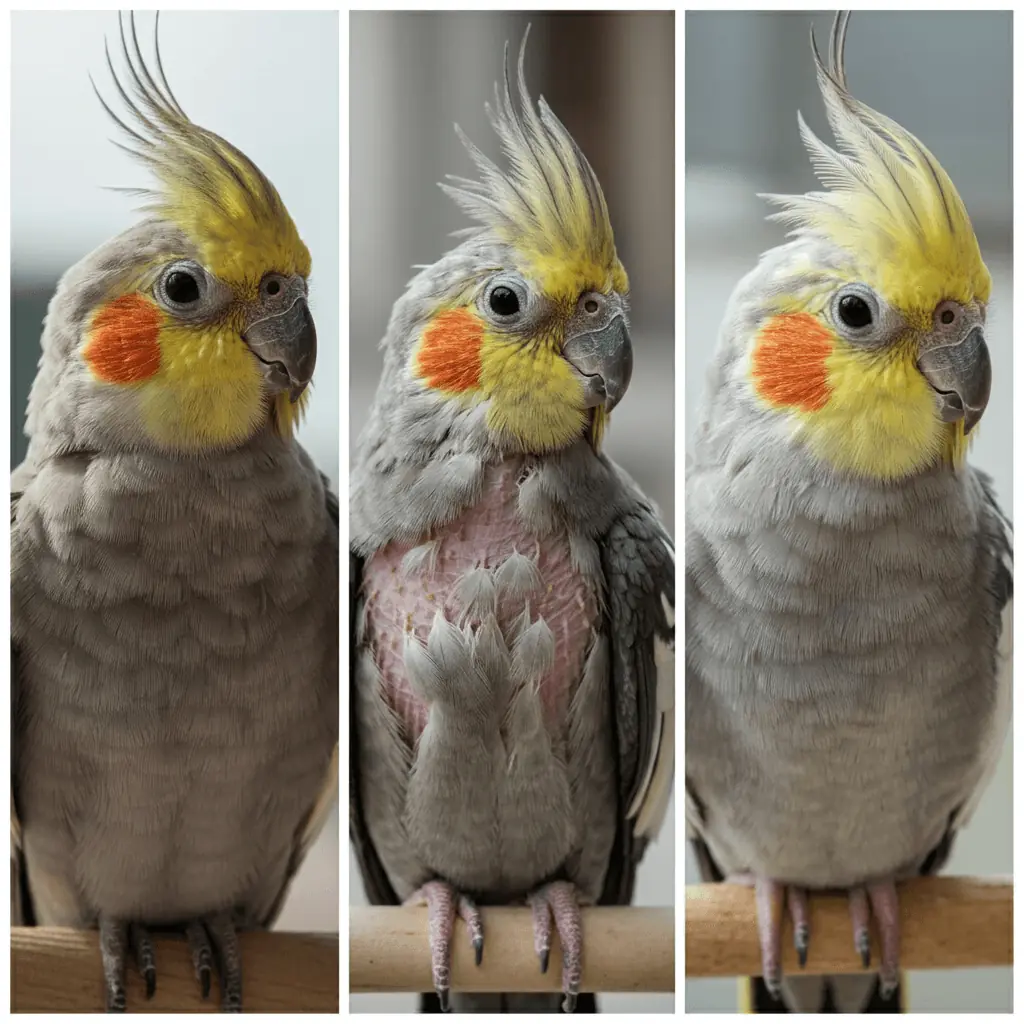Introduction
Cockatiels are delightful, affectionate pets, but like all birds, they can experience a variety of health issues. Being aware of common cockatiel health problems is crucial for ensuring your feathered friend lives a long and happy life. From respiratory infections to feather plucking, these issues can impact your bird’s well-being if not addressed promptly.
In this guide, we’ll walk you through the most common cockatiel health issues, how to recognize the signs, and—most importantly—how to prevent them. Whether it’s noticing subtle changes in their behavior or managing their diet to avoid obesity, this post will give you practical tips to keep your cockatiel healthy and thriving. By the end, you’ll have the knowledge to spot potential health problems and take action before they worsen, helping you prevent costly vet bills and unnecessary stress for your pet.
Caring for a cockatiel involves more than just providing food and water—it’s about understanding their unique needs and spotting any signs of illness early. With proper care, you can prevent many common diseases and ensure your bird stays in top condition. Let’s dive into the specifics of cockatiel health issues and how you can protect your bird from them.
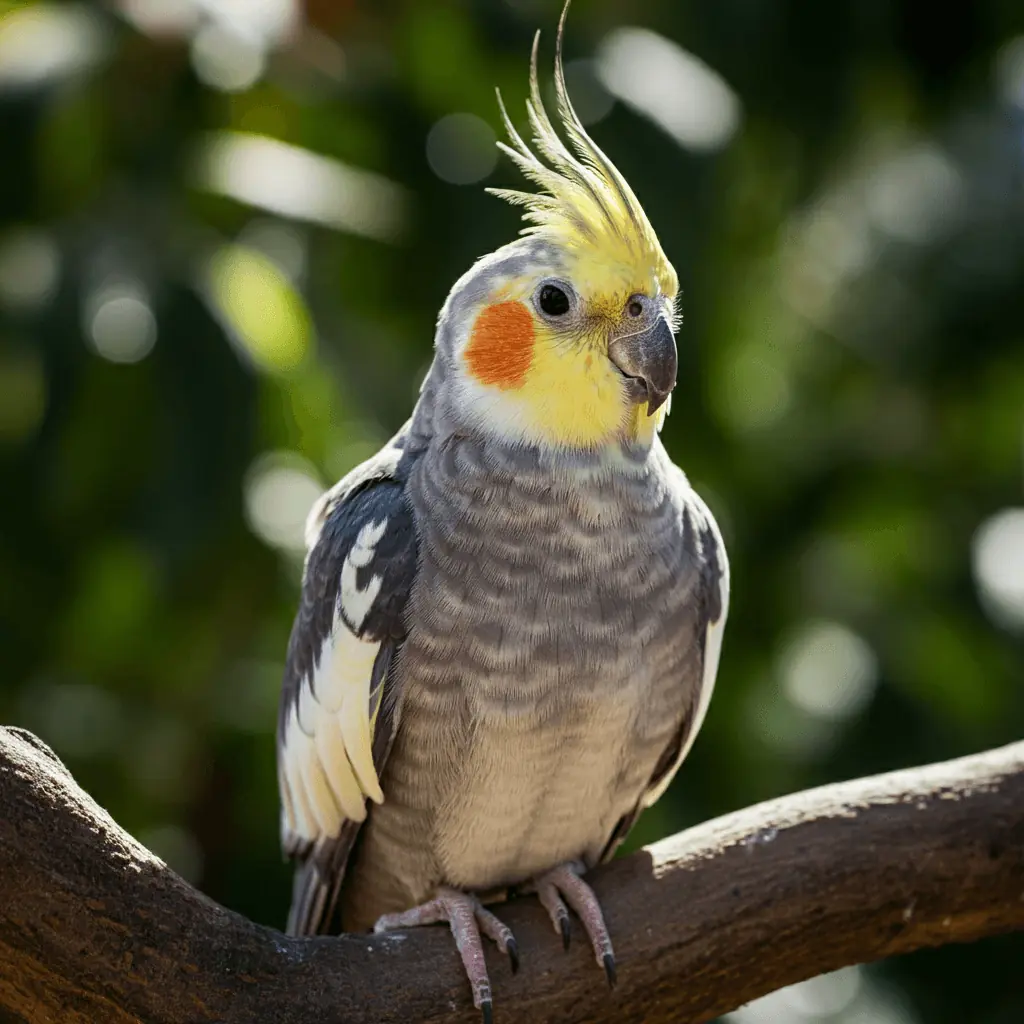
A healthy cockatiel perched on a branch, showing signs of vibrant plumage and clear eyes—indicators of good health.
1. Respiratory Infections in Cockatiels
Respiratory infections are one of the most common cockatiel health issues and can lead to serious complications if not caught early. These infections can be caused by bacteria, viruses, fungi, or poor living conditions. Dust, mold, and dirty cages can trigger respiratory problems in cockatiels, so maintaining a clean environment is key.
Causes of Respiratory Infections
Cockatiels are particularly sensitive to airborne irritants like dust, household chemicals, and even cigarette smoke. Bacterial infections are also common, especially in birds exposed to damp conditions or those living in overcrowded spaces. Viruses and fungi can further complicate matters, leading to persistent respiratory symptoms if left untreated.
Signs and Symptoms to Watch For
Early detection is crucial. If your cockatiel shows signs of difficulty breathing, wheezing, sneezing, or nasal discharge, these could all be warning signs of a respiratory infection. Watch for changes in behavior too—lethargy, reduced appetite, or puffed-up feathers are all potential indicators of illness.
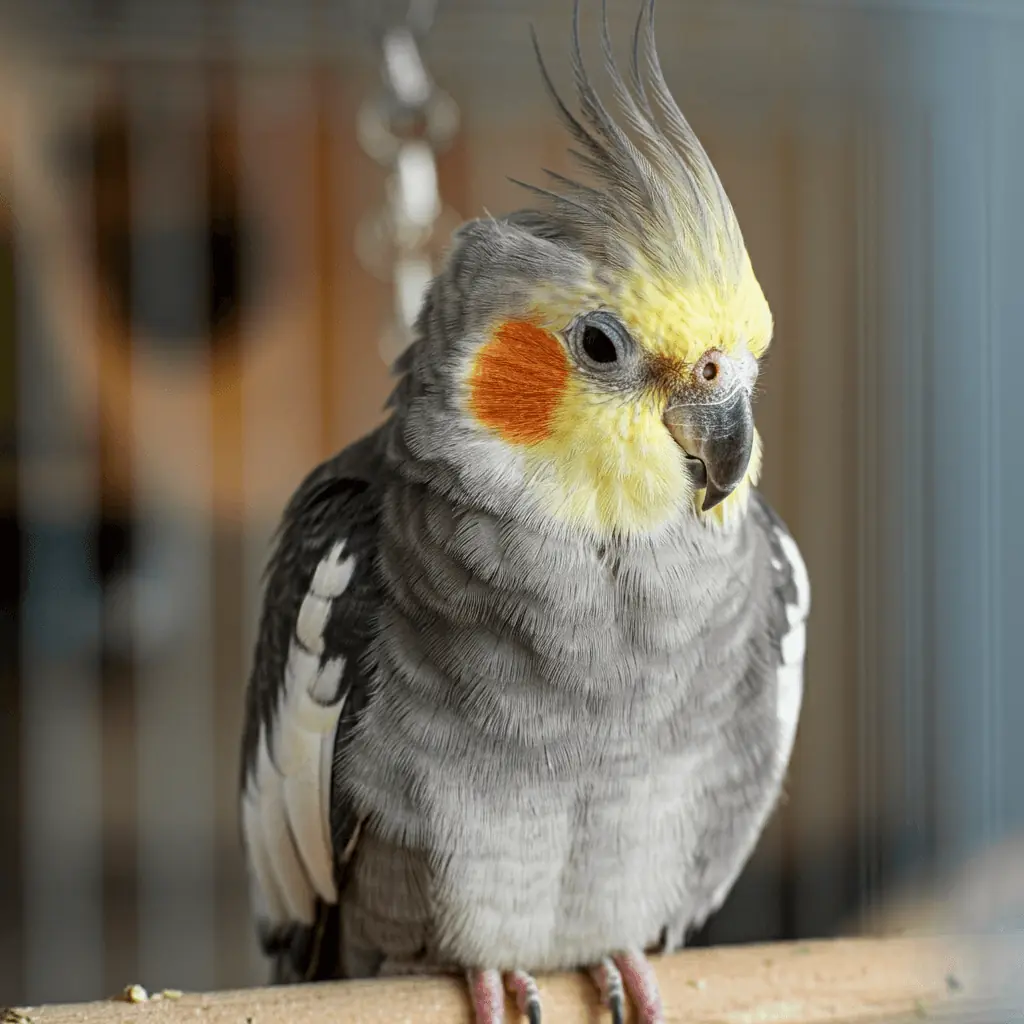
A cockatiel exhibiting signs of respiratory distress, including fluffed-up feathers and lethargy, common symptoms of respiratory infections in cockatiels.
How to Prevent Respiratory Infections
Prevention starts with keeping your cockatiel’s living area clean and well-ventilated. Regularly clean the cage, remove any dust or debris, and ensure your bird is not exposed to harmful chemicals or smoke. Fresh air and proper humidity levels can also help prevent respiratory problems. Additionally, providing your bird with a nutritious diet strengthens their immune system, making them less susceptible to infections.
In summary, respiratory infections in cockatiels are serious but preventable with proper care and early detection. By keeping a close eye on your bird’s behavior and maintaining a clean environment, you can significantly reduce the risk of these common health problems.
2. Psittacosis (Parrot Fever)
Psittacosis, also known as Parrot Fever, is a bacterial infection that affects many birds, including cockatiels. It’s one of the more serious common cockatiel health issues because it can be transmitted to humans, making it vital to recognize the signs early and seek treatment promptly.
What is Psittacosis?
Psittacosis is caused by the bacteria Chlamydia psittaci, which can be passed between birds and humans. In cockatiels, the bacteria often infect the respiratory system but can also spread to other organs. Since it’s highly contagious, it’s important to isolate any bird showing symptoms and contact a vet immediately.
Symptoms of Psittacosis in Cockatiels
Cockatiels with Psittacosis may exhibit a range of symptoms, including difficulty breathing, eye discharge, lethargy, and a loss of appetite. Sneezing, nasal discharge, and green or yellow droppings can also signal an infection. Because these signs are similar to other cockatiel health problems, it’s crucial to get an accurate diagnosis from a veterinarian.
Prevention and Treatment of Psittacosis
Preventing Psittacosis starts with good hygiene and regular health checkups. Make sure your bird’s cage is kept clean, avoid overcrowded spaces, and quarantine any new birds before introducing them to your cockatiel. If your cockatiel is diagnosed with Psittacosis, antibiotics prescribed by a vet will be necessary to treat the infection.
While this disease is treatable, it’s critical to act fast. Left untreated, Psittacosis can lead to severe health complications or even death. Since it’s a zoonotic disease (meaning it can spread to humans), keeping your bird healthy also helps protect you and your family.
3. Feather Plucking in Cockatiels
Feather plucking is a common yet concerning issue among cockatiels. It can be distressing to see your bird pulling out its own feathers, and it often signals underlying health or behavioral problems. Understanding why cockatiels pluck their feathers and knowing how to prevent it is key to maintaining your bird’s well-being.
Common Causes of Feather Plucking
Feather plucking in cockatiels can be caused by several factors, including stress, boredom, poor nutrition, or underlying medical conditions. Cockatiels are highly social birds, and they may start plucking if they feel neglected or don’t get enough mental stimulation. Sometimes, parasites or skin infections can also trigger plucking, which is why it’s important to rule out any medical issues first.
How to Identify Feather Plucking Issues
Feather plucking is more than just the occasional loss of a feather. If your cockatiel is repeatedly pulling out its feathers, especially in patches, this is a clear sign of a problem. You may also notice bald spots or irritated skin where feathers have been pulled. Keep an eye out for changes in behavior as well—an anxious or bored cockatiel is more likely to engage in feather plucking.
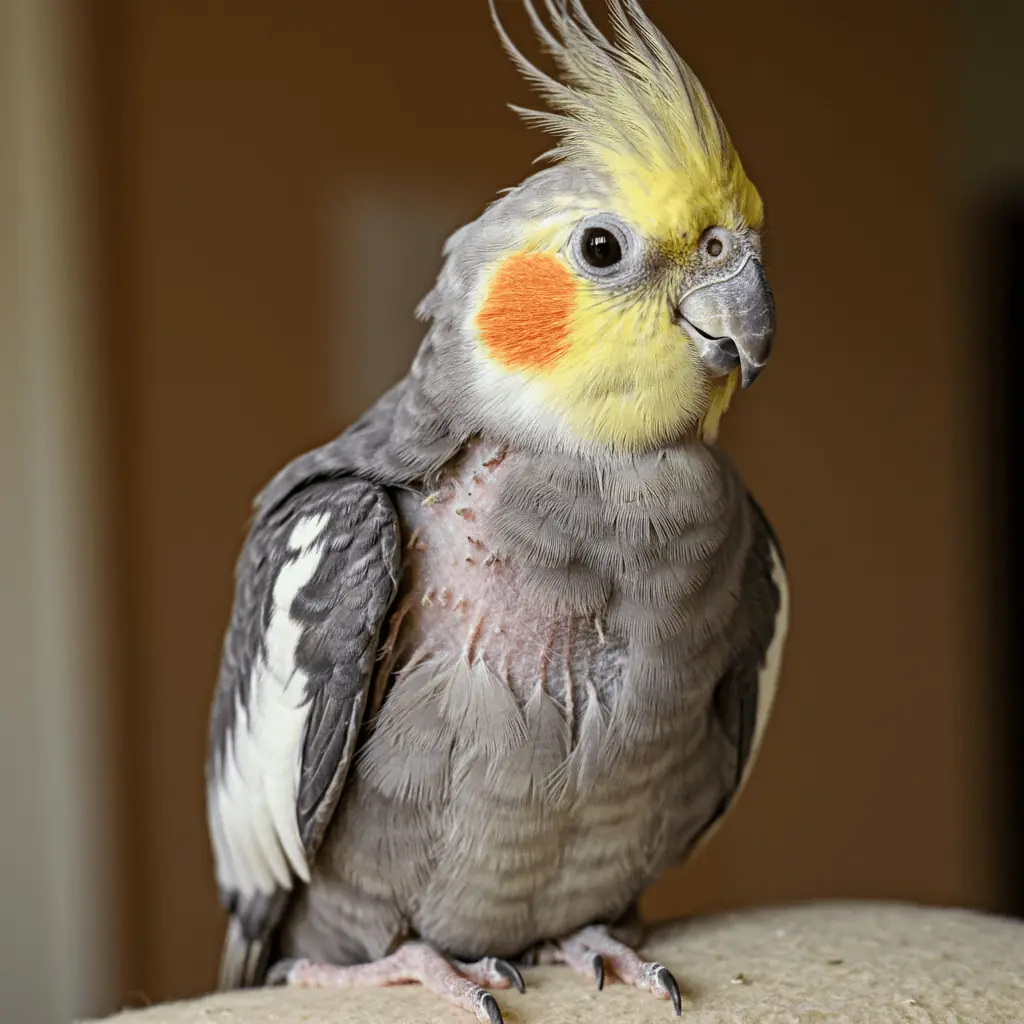
A cockatiel suffering from feather plucking, a common behavioral and health issue that can result from stress or underlying medical conditions.
Effective Ways to Prevent Feather Plucking
Preventing feather plucking starts with creating a healthy, enriching environment for your cockatiel. Ensure they have plenty of toys, perches, and opportunities for interaction to keep them mentally stimulated. A balanced diet rich in nutrients is also essential for maintaining their physical health and reducing stress. If you suspect an underlying health problem, consult with a vet to address any potential medical issues. In some cases, simply giving your bird more attention and playtime can greatly reduce the urge to pluck.
Feather plucking is a common but preventable cockatiel health issue. By paying attention to your bird’s environment, diet, and mental well-being, you can help keep them from developing this frustrating habit.
4. Gastrointestinal Problems
Gastrointestinal problems in cockatiels are another common health issue that bird owners should be aware of. These issues can range from mild digestive discomfort to more serious conditions, and they often stem from an improper diet, infections, or stress. Understanding the symptoms and taking preventive measures can help you keep your cockatiel’s digestive system healthy.
Recognizing Digestive Issues in Cockatiels
Cockatiels with gastrointestinal problems may exhibit symptoms such as diarrhea, vomiting, weight loss, or a decrease in appetite. Changes in the consistency or color of their droppings are also common indicators. If your bird appears lethargic, fluffs up its feathers, or avoids eating, these could be signs of a digestive issue that requires attention.
Common Causes of Gastrointestinal Problems
Poor diet is one of the leading causes of gastrointestinal issues in cockatiels. Feeding them too many seeds or low-quality food can lead to malnutrition, which in turn affects their digestive health. Bacterial infections, parasites, and stress from environmental changes can also disrupt their digestive system. In some cases, consuming spoiled or contaminated food may lead to serious stomach issues.
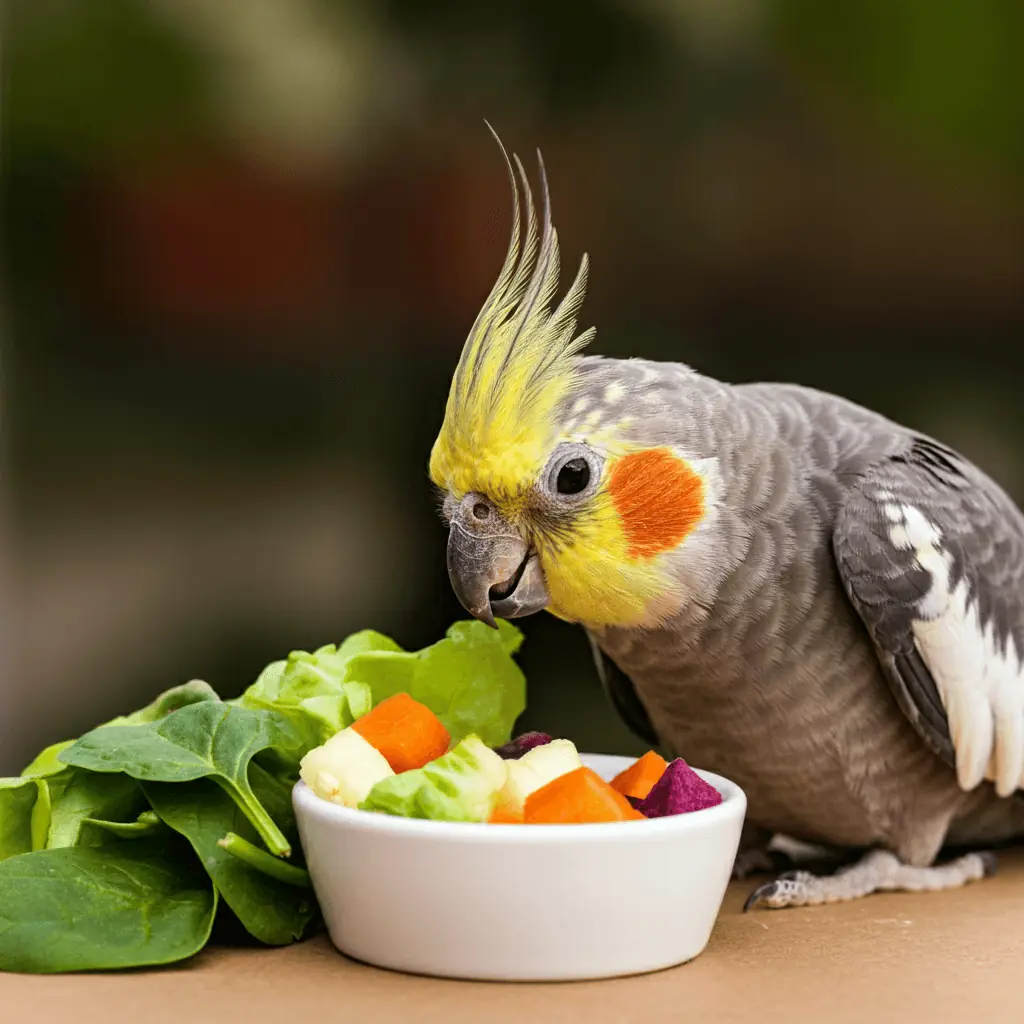
A cockatiel enjoying fresh vegetables, an essential part of a balanced diet that helps prevent many common health issues in cockatiels.
Prevention and Dietary Recommendations
To prevent gastrointestinal problems in cockatiels, it’s essential to provide a balanced, nutrient-rich diet. Incorporate fresh fruits, vegetables, and high-quality pellets into their meals to ensure they receive the necessary vitamins and minerals. Avoid feeding them too many seeds, as these can be high in fat and lead to long-term health problems like obesity or digestive troubles. Regular cleaning of food and water dishes is also important to prevent the spread of bacteria and parasites.
Additionally, keeping stress levels low by providing a stable, comfortable environment for your cockatiel will help support their overall digestive health. If you notice persistent digestive issues, it’s best to consult with an avian vet to rule out any underlying medical conditions.
Gastrointestinal problems in cockatiels can often be managed with proper diet and care, ensuring that your bird stays healthy and comfortable.
5. Egg Binding in Female Cockatiels
Egg binding is a serious and potentially life-threatening condition in female cockatiels. It occurs when an egg becomes stuck in the bird’s reproductive tract, preventing it from being laid. While it’s one of the more specific common cockatiel health issues, it’s important for any cockatiel owner to recognize the signs and know how to respond quickly.
What is Egg Binding?
Egg binding happens when a female cockatiel is unable to pass an egg due to factors like malnutrition, a lack of calcium, or an egg that is too large to pass through the reproductive system. This condition is most common in birds that are not receiving proper care, but even well-cared-for cockatiels can experience it, especially if they are frequent egg layers.
Symptoms of Egg Binding
The signs of egg binding can be subtle at first, but they usually escalate quickly. A female cockatiel with egg binding may appear lethargic, sit at the bottom of her cage, or strain without successfully laying an egg. Swelling in the abdominal area, labored breathing, and lack of appetite are other telltale symptoms. If you suspect your cockatiel is egg bound, it’s essential to act fast as this can be a life-threatening condition.
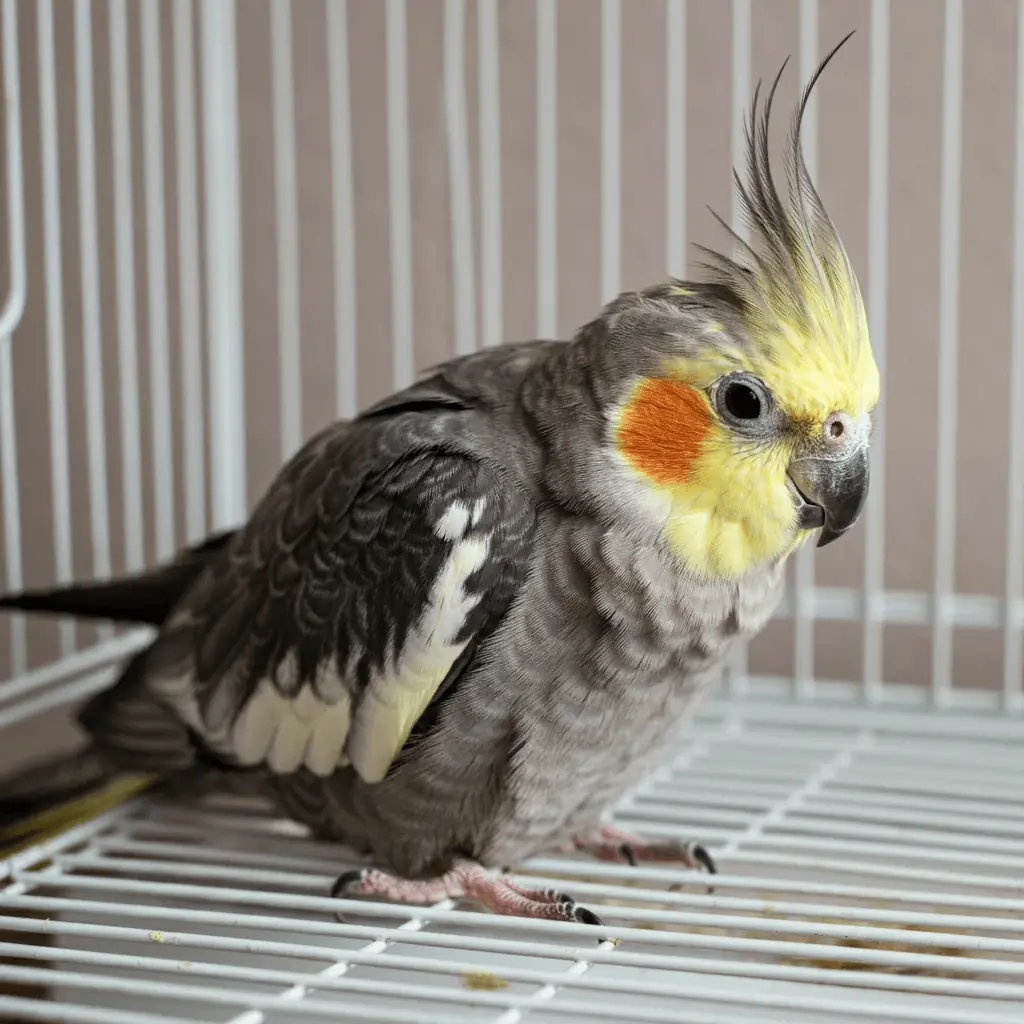
A female cockatiel experiencing egg binding, a common reproductive issue that can be life-threatening without proper care.
How to Prevent and Treat Egg Binding
Prevention of egg binding starts with proper nutrition. Ensuring your cockatiel gets enough calcium, vitamin D, and other essential nutrients is crucial. Cuttlefish bones and calcium supplements are commonly used to support healthy egg-laying. A balanced diet that includes leafy greens, fruits, and vegetables can help as well.
For birds that are prone to laying eggs, it’s important to monitor their health closely. If you notice any signs of egg binding, it’s best to consult with an avian vet immediately. Treatment may involve gentle warming, calcium injections, or even surgery in severe cases.
Egg binding is a serious but preventable condition in female cockatiels. With the right care and attention, you can help your bird avoid this potentially dangerous health issue and ensure she stays healthy and comfortable.
6. Vitamin Deficiency and Malnutrition
Vitamin deficiency and malnutrition are common but often overlooked health issues in cockatiels. A poor diet lacking in essential nutrients can lead to serious health problems, weakening your bird’s immune system and making them more susceptible to disease. Recognizing the signs early and ensuring your cockatiel receives a balanced diet is critical for their overall well-being.
Common Vitamin Deficiencies in Cockatiels
Cockatiels are particularly prone to deficiencies in vitamins A, D, and calcium. Vitamin A deficiency, for example, can lead to respiratory infections and poor feather quality, while a lack of vitamin D and calcium can result in weak bones and egg-laying issues in females. Malnutrition can affect all aspects of your bird’s health, from its energy levels to the quality of its feathers and skin.
Symptoms of Malnutrition
A cockatiel suffering from malnutrition may show several signs, including dull or discolored feathers, lethargy, weight loss, and brittle nails. If your bird is frequently sick or seems weak, it could be a result of a poor diet. You might also notice changes in behavior, such as a decrease in activity or vocalization. In more severe cases, vitamin deficiency can lead to serious conditions like egg binding or respiratory problems.
How to Prevent Vitamin Deficiency and Promote a Healthy Diet
Preventing vitamin deficiency and malnutrition in cockatiels starts with providing a diverse and balanced diet. Fresh fruits and vegetables, such as carrots, spinach, and sweet potatoes, are excellent sources of vitamins. High-quality pellets should make up the majority of your bird’s diet, as they are designed to provide all the essential nutrients your cockatiel needs. Avoid relying solely on seeds, as they are often high in fat and low in the vitamins that your bird requires.
In addition, offering cuttlebone or mineral blocks can help ensure your cockatiel is getting enough calcium. Regular vet check-ups can also help detect early signs of vitamin deficiency, allowing you to adjust your bird’s diet before more serious problems arise.
By feeding your cockatiel a varied and nutrient-rich diet, you can prevent common vitamin deficiencies and ensure they stay happy, healthy, and full of energy.
7. Beak and Feather Disease (PBFD)
Beak and Feather Disease (PBFD) is one of the most serious common cockatiel health issues, affecting both the appearance and health of your bird. This viral disease can cause irreversible damage to your cockatiel’s feathers, beak, and immune system, leading to lifelong complications if not managed early.
Overview of PBFD
PBFD is caused by a virus that targets the cells responsible for feather and beak growth. It is highly contagious and can spread through direct contact with infected birds or contaminated environments. While it primarily affects young cockatiels, adult birds are not immune, and the disease can be fatal if left untreated.
Symptoms of Beak and Feather Disease
The most visible sign of PBFD is abnormal feather loss or deformed feathers. Cockatiels with this disease may also experience brittle or misshapen beaks, making it difficult for them to eat. Other symptoms include lethargy, weight loss, and an increased susceptibility to secondary infections due to a weakened immune system. The disease progresses over time, and symptoms worsen as the bird’s immune system deteriorates.
Prevention and Management of PBFD
Unfortunately, there is no cure for PBFD, but there are ways to manage the disease and prevent its spread. The best prevention is to ensure your cockatiel is housed in a clean, controlled environment and avoid contact with birds that may be carriers of the virus. Quarantine any new birds before introducing them to your cockatiel, as PBFD can easily spread between birds.
For cockatiels diagnosed with PBFD, management focuses on supportive care to keep them comfortable. This includes ensuring they have a balanced, nutrient-rich diet and providing a stress-free environment to prevent secondary infections. Regular vet checkups can help monitor the progression of the disease and address any complications that arise.
Beak and Feather Disease is a devastating condition, but with proper care and early intervention, you can help your cockatiel live a more comfortable life despite the diagnosis.
8. Cockatiel Mites and Parasites
Mites and parasites are common problems for cockatiels, and if left untreated, they can lead to significant discomfort and health issues. These tiny pests can cause irritation, feather loss, and even weaken your bird’s immune system. Recognizing the early signs and knowing how to prevent infestations is key to keeping your cockatiel healthy.
Types of Mites and Parasites
Cockatiels are susceptible to several types of mites and parasites, with feather mites, red mites, and scaly face mites being the most common. Feather mites live on your bird’s feathers, causing itching and feather damage, while red mites are nocturnal parasites that feed on your cockatiel’s blood. Scaly face mites, on the other hand, burrow into the skin around the beak and legs, leading to crusty, irritated areas.
Signs of Mite and Parasite Infestations
It can be easy to miss the early signs of mite or parasite infestations, but paying close attention to your cockatiel’s behavior is key. Excessive scratching, feather plucking, and restlessness, particularly at night, can indicate the presence of mites. You may also notice red, irritated skin or small bald patches. For scaly face mites, a telltale sign is crusty scales forming around the beak and legs. If your cockatiel appears uncomfortable or agitated, it’s essential to investigate further.
How to Prevent and Treat Mite and Parasite Issues
Prevention begins with maintaining a clean environment. Regularly clean your cockatiel’s cage, perches, and toys to minimize the chances of mites or parasites taking hold. Quarantine new birds before introducing them to your cockatiel, as mites can easily spread from one bird to another. Keeping your bird’s living space clean and ensuring proper hygiene are the best defenses against infestations.
If you suspect your cockatiel has mites or parasites, consult a vet immediately. Treatment typically involves anti-parasitic sprays or medications, which are effective at eliminating mites. In severe cases, your bird may need additional treatment to heal from skin irritation or infections caused by the parasites.
Mites and parasites are common cockatiel health problems, but with early detection and proper care, they can be managed or avoided entirely. Keeping a clean and safe environment is the key to protecting your bird from these pesky invaders.
9. Obesity in Cockatiels
Obesity in cockatiels is a growing concern for bird owners, as it can lead to a range of serious health problems, including heart disease, liver issues, and a shortened lifespan. Cockatiels are prone to obesity if they don’t receive proper nutrition and exercise, making it important to monitor their weight and diet closely.
Causes of Obesity in Cockatiels
The most common cause of obesity in cockatiels is a diet that is too high in seeds. While seeds are a favorite treat for most birds, they are also high in fat and low in essential nutrients. A cockatiel that primarily eats seeds without other foods like fresh fruits, vegetables, or pellets is more likely to become overweight. In addition, lack of exercise plays a significant role in weight gain, especially if your bird spends most of its time in a cage without ample opportunity to fly or play.
Signs of Obesity
Recognizing obesity in cockatiels can sometimes be tricky, as they naturally have a fluffy appearance. However, if you notice your cockatiel’s breastbone becoming difficult to feel due to excess fat, this could be a sign of obesity. Other indicators include lethargy, difficulty flying, or rapid breathing after minimal activity. Weighing your bird regularly can also help you track any weight gain over time.
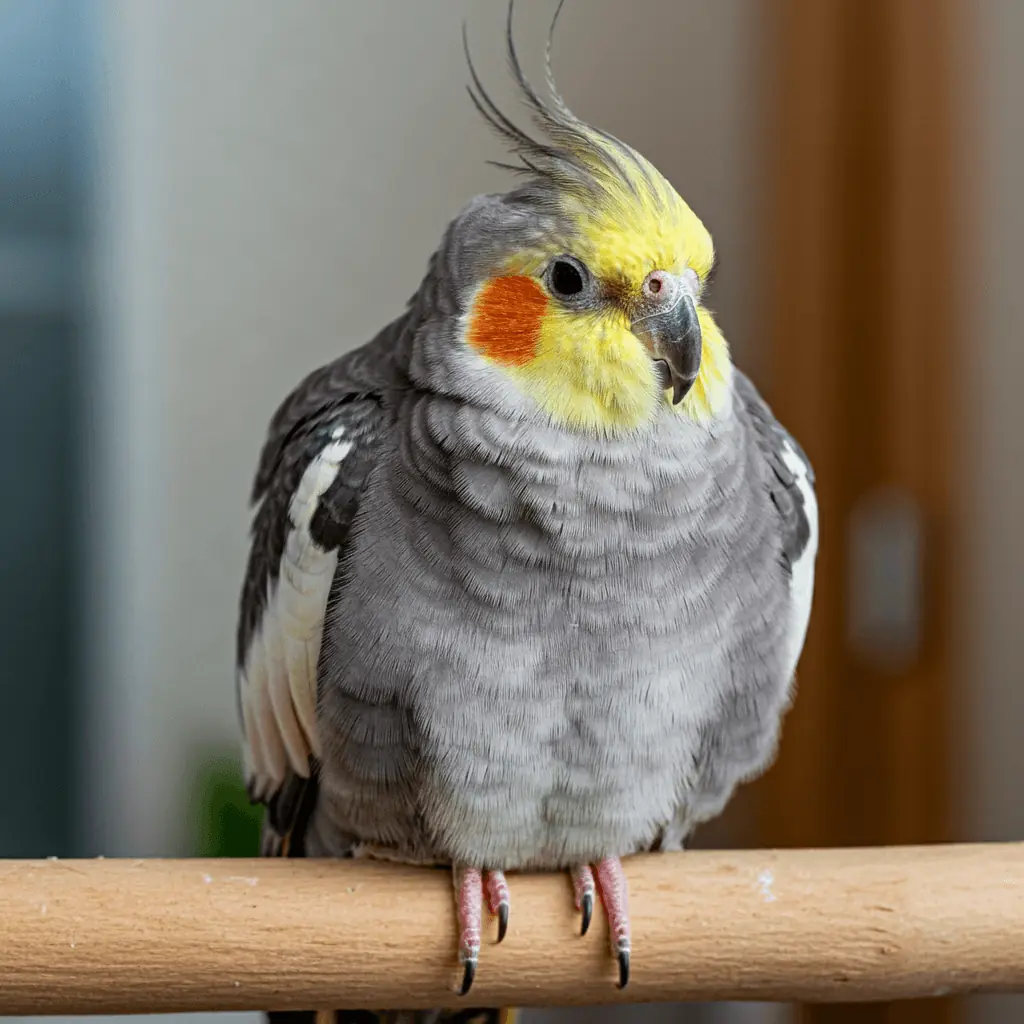
An overweight cockatiel, which is at risk for obesity-related health issues such as liver disease and shortened lifespan.
Prevention and Management of Obesity
Preventing obesity in cockatiels starts with a well-balanced diet. Limit the amount of seed-based food and instead offer high-quality pellets, which are nutritionally complete. Fresh vegetables like leafy greens and carrots, along with small amounts of fruit, can provide the necessary vitamins and minerals to keep your bird healthy. Make sure your cockatiel has plenty of opportunities to exercise by encouraging flying, climbing, and interactive playtime outside of the cage.
If your cockatiel is already overweight, consult with a vet to create a safe weight-loss plan. Gradually reducing the amount of high-fat seeds and increasing exercise will help your bird shed the excess weight and return to a healthier state.
Obesity is a common cockatiel health issue, but with the right diet and plenty of physical activity, it’s completely preventable. Keeping your cockatiel at a healthy weight will ensure a longer, more active life for your feathered friend.
FAQs
1. What are the most common cockatiel health issues?
Common cockatiel health issues include respiratory infections, feather plucking, gastrointestinal problems, egg binding in females, vitamin deficiencies, mites, parasites, and obesity. It’s important to recognize the symptoms early and take preventive measures to keep your cockatiel healthy and happy.
2. How can I prevent my cockatiel from developing health problems?
Preventing cockatiel health issues starts with providing a balanced diet, a clean living environment, and regular exercise. Ensuring your cockatiel gets enough vitamins and minerals, particularly calcium and vitamin A, can help prevent issues like malnutrition and egg binding. Regular vet checkups can also help identify problems early.
3. What should I feed my cockatiel to avoid vitamin deficiencies?
To avoid vitamin deficiencies, offer your cockatiel a varied diet that includes high-quality pellets, fresh fruits, and vegetables like carrots, spinach, and sweet potatoes. Avoid feeding your bird only seeds, as they are low in essential nutrients. Cuttlebone or calcium supplements are also useful for maintaining your cockatiel’s overall health.
4. How do I know if my cockatiel has respiratory issues?
Signs of respiratory infections in cockatiels include sneezing, nasal discharge, wheezing, difficulty breathing, and lethargy. If you notice any of these symptoms, it’s important to consult with a vet immediately to prevent the infection from worsening.
5. How can I prevent mites and parasites in my cockatiel?
To prevent mites and parasites, keep your cockatiel’s cage clean, regularly wash perches and toys, and ensure new birds are quarantined before introducing them to your pet. If you suspect a mite infestation, consult a vet for treatment options like anti-parasitic sprays or medications.
6. What should I do if my cockatiel is overweight?
If your cockatiel is overweight, start by adjusting its diet to include more fresh vegetables and high-quality pellets while reducing the number of seeds. Encourage more physical activity by allowing your bird to fly and engage in playtime outside of the cage. A vet can also provide a safe weight-loss plan for your bird.
7. How can I tell if my cockatiel has egg binding?
Symptoms of egg binding include lethargy, straining to lay an egg, sitting at the bottom of the cage, and a swollen abdomen. If you suspect your cockatiel is egg bound, seek veterinary care immediately, as this is a serious condition that requires urgent treatment.
Conclusion
Taking care of your cockatiel’s health involves more than just feeding and cleaning—it’s about recognizing the signs of common cockatiel health issues and knowing how to prevent them. From respiratory infections and feather plucking to obesity and egg binding, understanding these conditions can make a big difference in your bird’s overall well-being.
By providing a balanced diet, maintaining a clean and stimulating environment, and scheduling regular vet checkups, you can prevent many of the health problems that commonly affect cockatiels. Early detection is crucial, so always pay attention to changes in your bird’s behavior, appearance, and appetite.
With the right care, your cockatiel can lead a healthy, happy life, free from many of the issues that affect pet birds. Whether you’re dealing with mites, vitamin deficiencies, or other concerns, this guide offers practical steps to keep your bird in top shape. Being proactive and informed will not only enhance your cockatiel’s quality of life but also strengthen the bond you share with your feathered friend.

